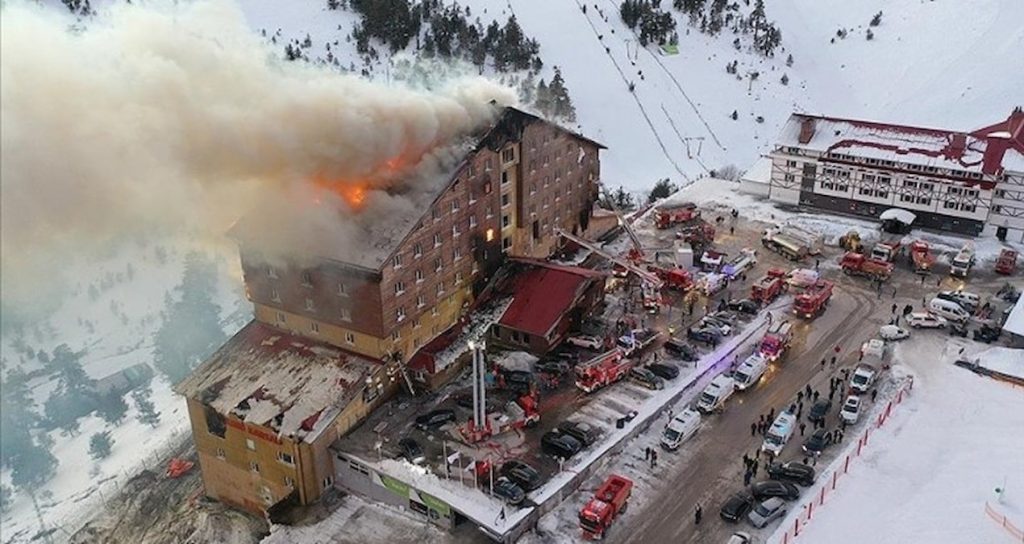The high-profile trial concerning the devastating fire at the Kartalkaya Ski Center that took place on January 21, which resulted in the tragic deaths of 78 individuals and injuries to 133 others, is currently underway in Bolu. This case involves 32 defendants—19 of whom are in detention—who are accused of various charges, including manslaughter. The hearings began on July 7, and as of today, several defendants have presented their testimonies, with the proceedings set to continue under stringent security measures.
| Article Subheadings |
|---|
| 1) Background of the Kartalkaya Fire Incident |
| 2) Legal Proceedings and Charges |
| 3) Defense Testimonies and Reactions |
| 4) Courtroom Atmosphere and Security Measures |
| 5) The Broader Implications of the Trial |
Background of the Kartalkaya Fire Incident
On January 21, a catastrophic fire broke out at the Grand Kartal Hotel, located in the Kartalkaya Ski Center, leading to a tragedy that left an indelible mark on the community and raised critical questions about safety regulations in hospitality venues. The incident resulted in the loss of 78 lives, with 133 others suffering injuries, marking one of the deadliest events in recent memory in the region. Eyewitnesses reported chaotic scenes as guests tried to escape the flames engulfing the building while emergency responders struggled to manage the overwhelming situation. The fire not only claimed lives but also highlighted serious flaws in emergency preparedness and building safety protocols.
Legal Proceedings and Charges
Following the incident, the Bolu Chief Public Prosecutor’s Office launched an extensive investigation. The indictment named 32 defendants, including hotel owners, board members, and various staff, all facing serious charges that could result in substantial prison sentences. Among the defendants is hotel owner Halit Ergül, along with other managers such as Emine Murtezaoğlu Ergül and Ceyda Hacıbekiroğlu. They are charged with ‘killing by possible negligence’ under Turkish law, which could lead to imprisonments of up to 22 years and 6 months if convicted. The prosecution also aims to hold various technical personnel and safety officials accountable, highlighting a systemic lack of oversight that contributed to the tragedy.
Defense Testimonies and Reactions
Throughout the first three days of hearings, various defendants took to the stand to provide their defenses. A notable testimony came from Aleyna B., an employee from FQC Global Certification, who was responsible for safety assessments at the hotel. Her defense argued that protocols were followed appropriately and that external factors may have contributed to the rapid spread of the fire. As the hearings progressed, other defendants, including hotel managers, presented their arguments, often invoking technical jargon and industry standards to bolster their claims. Community members and families of the victims expressed frustration as they listened to these defenses, feeling that the gravity of the situation was being glossed over.
Courtroom Atmosphere and Security Measures
The trial is being held in a converted gymnasium at Bolu Social Sciences High School, designed to accommodate the significant interest surrounding the case. The courtroom is equipped with advanced technology to ensure that testimonies and evidence can be properly recorded and analyzed. With heightened public interest, extensive security measures have been implemented; only those who pass thorough security checks may attend the proceedings. The somber mood in the courtroom reflects the profound losses experienced by the families of the victims, as they seek justice for their loved ones while grappling with their grief.
The Broader Implications of the Trial
This trial not only aims to seek justice for the victims of the Kartalkaya fire but also has broader implications for safety regulations in Turkey’s hospitality industry. As the nation grapples with how to prevent such tragedies from occurring in the future, many are calling for a reevaluation of safety standards and emergency protocols in buildings that host large numbers of individuals. The outcome of this case could influence future regulations and increase accountability for hotel owners and operators, as pressure mounts for a thorough examination of safety practices across the entire sector.
| No. | Key Points |
|---|---|
| 1 | The fire at the Grand Kartal Hotel resulted in 78 fatalities and 133 injuries. |
| 2 | 32 defendants are on trial for charges including manslaughter and negligence. |
| 3 | Intense public interest has transformed the gymnasium into a makeshift courtroom. |
| 4 | Defendants have begun presenting their defenses, often referencing safety standards. |
| 5 | The trial may influence future safety regulations in Turkey’s hospitality sector. |
Summary
The ongoing trial regarding the tragic fire at the Grand Kartal Hotel is not merely a legal process but a pivotal moment that could reshape safety standards in the hospitality industry across Turkey. As families seek justice for the profound loss and suffering caused by the fire, the actions taken by the defendants and the outcomes of the hearings will resonate throughout the community and beyond. This case underscores the necessity for stringent adherence to safety protocols and the importance of accountability in the face of such unprecedented tragedies.
Frequently Asked Questions
Question: What led to the fire at the Grand Kartal Hotel?
The exact cause of the fire is still under investigation; however, allegations of negligence by hotel management and safety personnel have surfaced.
Question: What charges are the defendants facing?
The defendants face charges including ‘killing by possible negligence,’ which could result in a prison sentence of up to 22 years and 6 months.
Question: How is public interest affecting the trial?
The trial has garnered significant media attention, leading to a large public turnout and heightened security measures, as many seek justice for the victims of the fire.


